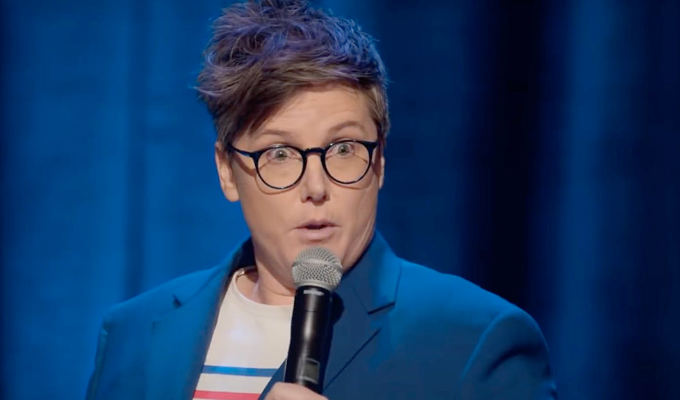
Hannah Gadsby: Douglas on Netflix
Note: This review is from 2020
Review by Steve Bennett
Despite the core premise of the remarkable Nanette, Hannah Gadsby did not turn her back on stand-up. How could she, given the major international breakthrough that Netflix special afforded her?
Although she did not quit comedy, Douglas demonstrates that Gadsby now doing it on her terms alone, subverting some of the conventions of the genre and leaning into the ‘haters’ who dismissed that astonishing previous piece because it didn’t fit their limited preconceptions of what stand-up should be.
With Douglas, the great Gadsby has taken the elevated profile Nanette gave her and used it to mark out her territory. Nourished by the opprobrium heaped upon her by reactionary critics, she fortifies her position, ‘needling’ the patriarchy and unpicking just how much of what society considers normal has been defined by generations of men. And she gives the anti-vaxxers what for, too.
While there now exists a whole genre of feminist stand-up, and nor before time, many comics stop at easily-mocked headline inequalities. But Gadsby reaches deeper to present fresh angles and a bigger picture - not to mention some hilariously pithy zingers that express complex thoughts succinctly and wittily. Yes, she sometimes delivers an impassioned battle cry that gets hollers of support more than laughs, but these are in addition to the gags, not in place of them.
Even when she starts with a commonplace complaint, such as the patronising call to ‘cheer up love’, she spins it into a wider context. We hear of arrogant condescending male gynaecologists, the failings and excuses bundled into the pat phrase ‘boys will be boys’, and the absurdity of Renaissance paintings, always seen from the male perspective (putting her history of art background to good use). If you accuse me of delivering a lecture, that’s just what I’ll do, is her contrarian standpoint. The woman who made comedy serious now makes the earnest flippant.
She not only sets out her agenda at the top of the show but the whole menu of the special, spending 15 minutes telling us precisely how the next hour will unfold, rewriting the unwritten rules of a stand-up special from the get-go.
We’re warned she’ll ease us in with observational comedy that’s she finds difficult since she’s not very observant. This turns out to be predominantly amusing if undemanding fare about the vagaries of American English. Then she gives a spoiler for her big revelation – that she has autism, a fact which frames the anti-vaxxers’ rant as well as providing an entertaining schoolday anecdote. And, finally, she foreshadows her closing joke, asserting will well-earned confidence that this revelation will make the gag more funny, not less. She’s right, such is her command and understanding of the audience.
In Nanette, Gadsby agued that low-status, self-deprecatory comedy was psychologically harmful, especially when trying to convert unprocessed trauma into laughs.
In the more accessible Douglas - which is inevitably less emotionally intense than its predecessor – she practises what she preached, coming out as a swaggering alpha, laying down the truths of the world as she sees them. Her aim is to disrupt the confidence of the complacent with some self-assurance of her own. That she does, and it supercharges her insightful mockery of the absurdity of the privileged and the ignorant.
Plus there are puns.
• Douglas was released on Netflix today. Watch here.
Review date: 26 May 2020
Reviewed by: Steve Bennett








